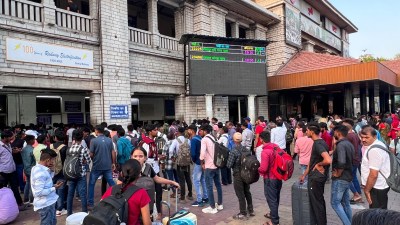The Minister146;s Roots
Old-timers of Baramati still recall the days decades ago when Sharad Pawar, then an energetic collegian and Youth Congress worker, would hau...

Old-timers of Baramati still recall the days decades ago when Sharad Pawar, then an energetic collegian and Youth Congress worker, would haul the Katewadi family farm8217;s produce to the local vegetable market.
8216;8216;Sweet lime, bananas, sugarcane, vegetables8230; That8217;s what they grew. He would work in the farm in his holidays,8217;8217; says Rajendra Pawar, chairman of the Baramati Agriculture Development Trust.
The trust Sharad Pawar, 64, launched in 1972 he is founder-president has bonded scattered small and marginal farmers with a one-stop source for training, diagnosis, consultancy and technology through a Krishi Vigyan Kendra KVK.
8216;8216;Some 3,500 farmers approach the KVK every year,8217;8217; says Tarannum Kadarbhai, chief scientist at KVK. 8216;8216;Pawar as agriculture minister is good for the country because he knows every real constraint of agriculture.8217;8217;
Secret Garden
The smooth, tree-lined road to 27 heavily guarded acres called Govindbaug is lined by rows of women selling fat bunches of grapes right up to the gates.
Here8217;s where Pawar can ditch his Delhi treadmill to come home to a daily walk in the woods: there are 36 types of trees and 12 acres under grapes. If he needs an ayurvedic home remedy for an ailment, he can pick it from his garden of vanaspati plants like brahmi and amla.
Fruit Fetish
It8217;s got to be Sharad Seedless, the luscious grape that bears his name. The grape variety is actually not a Baramati product, but was born in Solapur. Now popular in Baramati8217;s vineyards, its maximum production is from Tasgaon in Sangli district in south Maharashtra.
Baramati8217;s Big B
| nbsp; |
Baramati Barometer
|
||||
| nbsp; |
Area under winegrape production Story continues below this ad |
nbsp; | |||
Not far from Baramati8217;s fields wasting under drought is a 120-acre campus that is the region8217;s claim to a place on the world map. In February, Mukesh Ambani and Rahul Bajaj inaugurated the Vidya Pratisthan8217;s School of Biotechnology here.
This campus began with an English-medium school in 1972. Today 20,000 students 8212; most are sons and daughters of regional farmers 8212; crowd into its manicured gardens and rows of computer labs. Small and marginal farmers walk in for lab solutions from faculty and research students, to fix problems of soil, seeds and crop disease.
Reliance Life Sciences has promised to recruit the graduating batch of biotech students. On the board of the biotech governing council are biggies from Ranbaxy, Lupin, Serum Institute, Biocon, Exogen Biosystems.
Every drop counts
In 1968, Pawar noticed an Australian group donating wheat and oil as charity in rain-fed villages. He convinced them to provide wheat and oil as wages to villagers building percolation tanks to store rainwater. Over the years, this food-for-work scheme accounted for 289 tanks in rain-fed Baramati villages.
Grapes of growth
For over a decade, Bangalore Purple and Thompson Seedless grapes have been exported to Europe and the Gulf; in 2001-02, 13 containers of 15 tonnes each travelled abroad. Pawar played a key role in the formation of Mahagrapes, a partnership firm of 15 co-operatives for large-scale grape export.
8216;8216;For years there were dalals and grape growers could not get decent rates in urban markets,8217;8217; recalls Rajendra, who8217;s also director of Baramati Grape Industry.
Milky way
Pawar8217;s political and administrative power centre in Baramati flows from 2 lakh litres of milk produced daily by the milk co-operative known as the Baramati Doodh Sangh.
8216;8216;Despite drought, Baramati8217;s milk production is four-fold that of tehsils in Pune district,8217;8217; says Kadarbhai.
- 01
- 02
- 03
- 04
- 05































